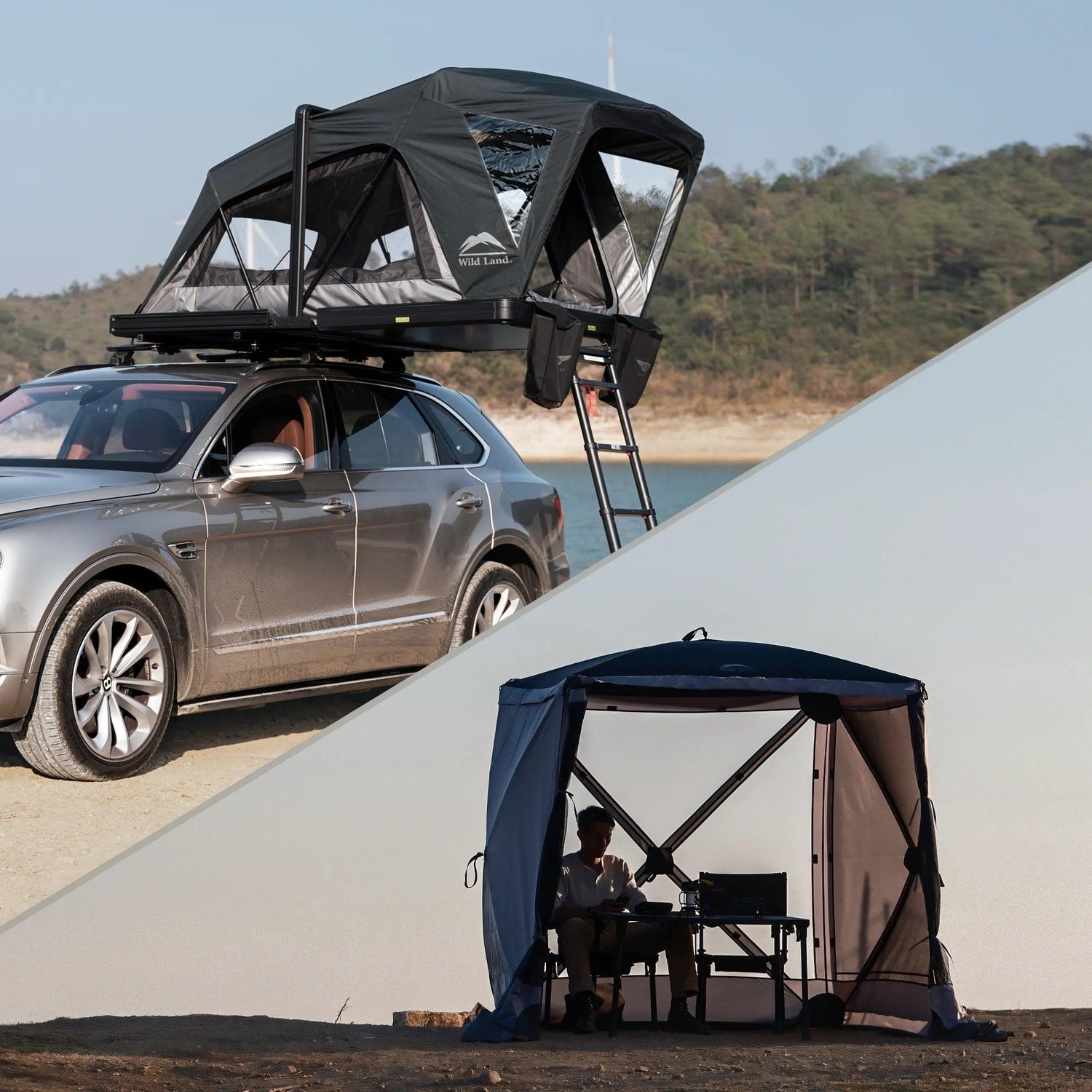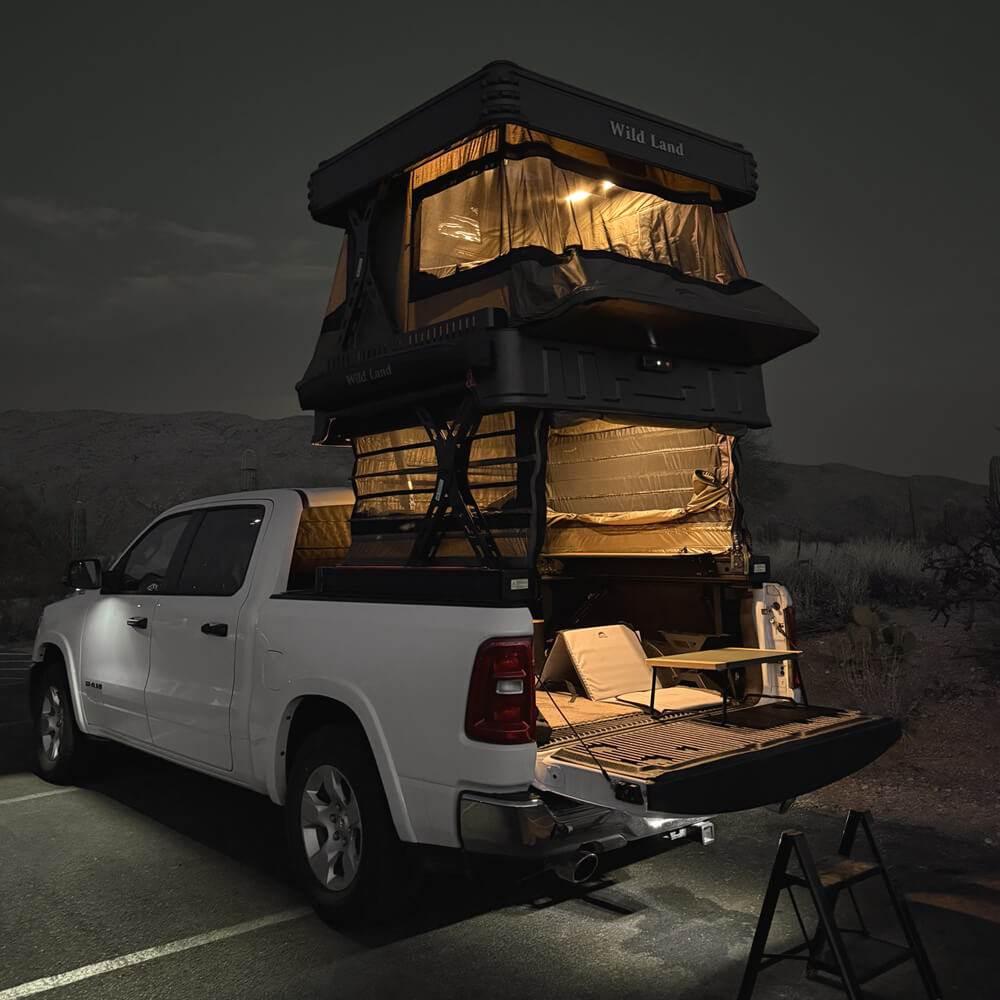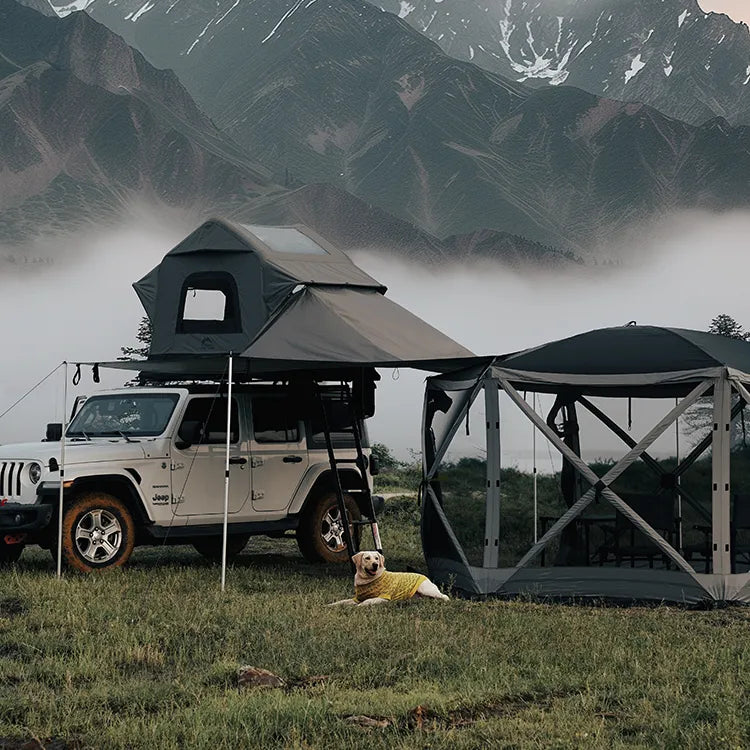Camping enthusiasts often debate which setup is better for the road – a rooftop tent mounted on your car or a traditional ground tent on the campsite floor. In truth, there’s “no clear winner”. Both options have their pros and cons. Let’s compare them side by side across key factors so you can choose the one that best suits your travel style.
Setup and Takedown Time
- Rooftop Tents: These tents are installed on the roof of your vehicle without the need for a mat or ground spikes. High-end hardshell rooftop tents often deploy quickly in one second by automatically lifting the tent with a gas pole once the clip is unlocked. Rooftop tents like the Wild Land even use patented hydraulic poles that can be fully erected in seconds. Stowing away is just as easy, just close the poles and lock the clips. In contrast, rooftop tents save a lot of assembly time, making it a time-saving and convenient experience for self-driving travelers who frequently change campsites.
- Ground tents: Traditional tents require finding a flat campsite, clearing the debris, and then spreading the tent base, inserting the poles, pulling the tent ropes and fixing the ground spikes. This series of steps is usually time-consuming. Even the quick-opening tents that claim to be able to be set up quickly take about 15 minutes to support a tent on their own. Therefore, the establishment and storage of ground tents are relatively cumbersome, especially after sunset or when the weather is bad.
Comfort (Sleep, Ventilation, Ground Moisture)

Rooftop tents are usually equipped with thicker foam mattresses for more comfortable sleep. Because the tent is suspended in the air, the bed does not need to bear the cold, hard or wet ground, and will not be soaked by the ground air when sleeping. The tent has large windows and mosquito nets on all four sides, which can provide good ventilation and a wider view. Wild Land's tent is designed with three layers of waterproof fabric and thickened lining with good sealing, and can also reduce condensation at night through the upper ventilation holes. In general, rooftop tents are often slightly better in terms of sleeping comfort and dryness.
Generally, ground tents provide more spacious space and are suitable for multiple people or teams; some large tents can even accommodate an inflatable bed, tables and chairs, and a lot of luggage. However, the mattresses of ground tents are usually thinner, and you need to bring your own or buy a sleeping pad. In addition, after rain or at night, the bottom of the tent is easily affected by ground moisture. If the drainage is not good, the ground will be very wet, which is a clear advantage of rooftop tents.

Ground tents are generally larger and suitable for multiple people, but the mattress is thinner and the sleeping feel is harder. Especially in muddy environments, ground tents are often covered with mud and water, while roof tents are suspended in the air and are not affected by ground moisture. Ground tents need to be moisture-proof, such as using tent mats or plastic sheets to isolate the ground air. In addition, there are rainproof cloths and ventilation windows on the top of ground tents, but the overall air permeability is sometimes not as good as that of specially designed roof tents. In general, if you prefer sleep quality and a flat and dry bed, a roof tent will be more suitable; if you need a larger living space and have experience in setting up ground tents, ground tents can meet your needs.
Weather Adaptability and Safety
- Rooftop Tents: These tents are usually made of heavy waterproof fabric and a sturdy hard shell, which is highly resistant to wind and rain. Many rooftop tents are equipped with high-density coated fabrics (such as PU3000mm) and have been subjected to harsh tests such as strong winds and heavy rain. High-end hard shell tents even use ABS shells and have been tested for 1,000 hours of simulated wind and rain to ensure waterproof, anti-corrosion and heat insulation. Rooftop tents are well sealed and have better thermal insulation, making them suitable for use in cold or rainy environments. In addition, the suspended design keeps you above the ground, which can avoid ground water and the intrusion of small animals, snakes and insects. In short, rooftop tents are usually stable in bad weather and can provide an extra sense of security.
- Ground Tents: If traditional tents are not properly staked, strong winds may blow down the tent and heavy rain may also pour into the tent. Ground tents need to be reinforced with ground nails and ensure that the tent fabric is fully spread to withstand wind and rain. Once there is too much water flowing on the ground, if the camping site is low, water may accumulate and enter the tent. Because it is close to the ground, if the surrounding temperature difference is large, condensation may also form on the wall. Therefore, in continuous rainy weather, special attention should be paid to drainage and moisture prevention. In terms of safety, roof tents keep a distance from ground creatures and stagnant water, and some people think they are safer; but in fact, large predators usually do not attack tents, and ground tents can also prevent the invasion of most insects and snakes as long as the zipper is kept closed.
Price and Longevity
- Rooftop Tents: The starting price of a rooftop tent is generally much higher than that of a ground tent of the same capacity. This is mainly because the structure of a rooftop tent is complex and the accessories (such as hard shell and support poles) are more expensive. However, in the long run, rooftop tents are generally more durable. A high-quality hard shell rooftop tent can have a service life of 10-15 years, and as long as it is properly maintained, the sturdy shell and waterproof fabric can withstand the test of long-term outdoor use. Brands such as Wild Land emphasize strict quality inspection and heavy materials to ensure that the tent can be used for a long time. In other words, although the initial investment is higher, a rooftop tent can become a long-term partner for many long-distance trips.
- Ground Tents: Ground tents are generally more economical, and the entry-level models are very cheap, which is suitable for beginners with limited budgets or who are just starting out. But the low price often means that the fabric and poles are thinner and may have a shorter service life and need to be replaced more frequently. In contrast, the price of high-end ground tents of the same quality will also be close to that of some rooftop tents, but they are usually still behind in terms of bearing capacity and protection performance. Considering the intensity of use, it would be more cost-effective to choose a better quality tent if you camp frequently or use it in rugged environments.
Suitable People and Usage Scenarios
- Rooftop Tents: Rooftop tents are particularly suitable for self-driving tours, off-road trips, and explorers who need to move camp frequently. For those who like to drive long distances, cross different terrains, or camp in remote areas, rooftop tents provide convenience and comfort. Couples or small families can use rooftop tents to save time setting up and enjoy a better sleep experience. In addition, outdoor enthusiasts who like to overlook the scenery will also enjoy the high-altitude perspective brought by rooftop tents. Brands such as Wild Land are targeting this type of users, emphasizing the ease of use and high quality of products to make off-road camping more worry-free.
- Ground Tents: Ground tents are suitable for scenarios where you don’t rely on vehicles, plan to camp for a long time, or camp with multiple people. Ground tents are often used for hiking camping, family camping, or multi-person group activities because they have large space and can accommodate more people and equipment. If you plan to stay in a campsite for several days, ground tents can remain in place; when using rooftop tents, if the vehicle needs to leave the campsite, the tent must be folded first. Ground tents are also more mobile, which is convenient for friends to borrow or share between several vehicles. For users with limited budgets or occasional campers, ground tents are an affordable choice.





Leave a comment
All comments are moderated before being published.
This site is protected by hCaptcha and the hCaptcha Privacy Policy and Terms of Service apply.